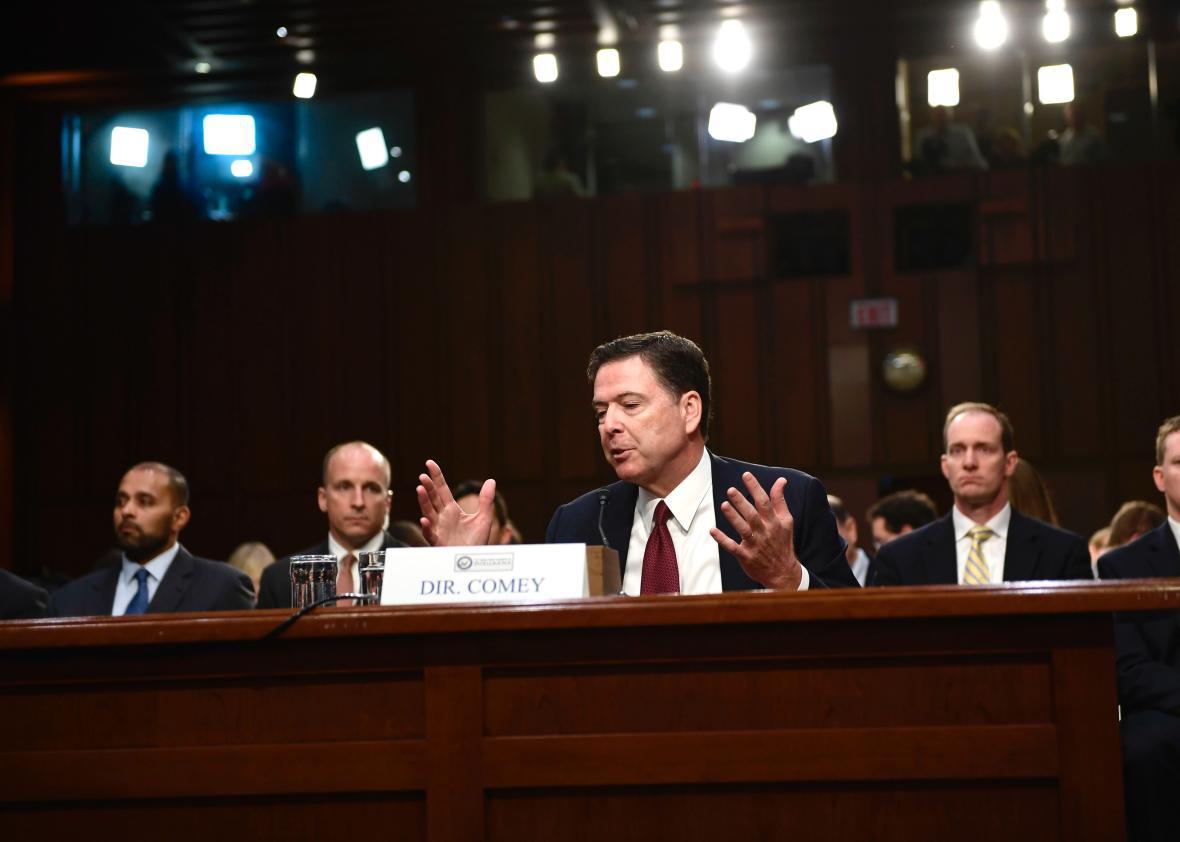Former FBI director James Comey’s appearance before the Senate Intelligence Committee on Thursday was revelatory for a number of reasons, including the charming mixture of colorful language and cultural allusions that Comey used in his testimony. Merriam-Webster even reported that lookups of a number of words Comey used had spiked:
So what to make of these colloquialisms? We did our best to define (or at least put into context) some of his more memorable turns of phrase, below.
Captain Courageous
When Sen. Marco Rubio asked why Comey hadn’t confronted Trump about his inappropriate requests, Comey’s modest response was, “I was a bit stunned and didn’t have the presence of mind. I don’t know. I don’t want to make it sound like I’m Captain Courageous.”
While this is also similar to the title of a novel by Rudyard Kipling, Comey was probably thinking more along the lines of the comic-book superhero known for helping those in need of bravery, with regard to standing up to Trump. (Rubio, of course, isn’t exactly Captain Courageous himself.)
“Lordy”
“Lordy, I hope there are tapes,” said Comey in response to a question about Trump’s suggestion in May that their conversations may have been recorded. Somewhat reminiscent of Neil Gorsuch’s many folksy exclamations during his Supreme Court confirmation hearings but far more remarkable.
“No fuzz”
Comey used this possibly peach-inspired phrase to express his certainty about Russian interference in the 2016 election cycle, saying, “There should be no fuzz on this whatsoever.” In fact, he used no fuzz twice during his explanation on Russia and then again later to emphasize that there was no confusion about the fact that he reported to the attorney general. A true Comey-ism.
“Seagulls at the beach”
Sen. Roy Blunt asked Comey about how the memo detailing his conversation with Trump about Michael Flynn found its way into the press in May, specifically questioning why Comey chose to publicize the memo through a friend, rather than releasing it to the media directly.
Comey’s response was to compare reporters to a bunch of hungry rats with wings, greedy for crumbs of information, whom he did not want to whip into a frenzy. “Because I was weary the media was camping at the end of my driveway at that point. I was actually going out of town with my wife to hide. I worried it would be feeding seagulls at the beach.”
“Will no one rid me of this meddlesome priest?”
In an exchange between Comey and Sen. Angus King, the two men revisited an earlier revelation by Comey in which he said he believed that Trump’s request that he drop the Flynn investigation was a directive. He even compared it to another dramatically open-to-interpretation comment from history:
King: In response to Mr. Risch I think you said [Trump] said “I hope you will hold back on that.” When a president of the United States in the Oval Office says something like “I hope” or “I suggest” or “Would you?” do you take that as a directive?
Comey: Yes. Yes, it rings in my ears kind of “Will no one rid me of this meddlesome priest?”
King was quick to concur and to put the quote in context: It is frequently attributed to Henry II, the 12th-century king whose seemingly offhand statement led a group of knights to kill Thomas Becket, archbishop of Canterbury and perpetual thorn in Henry’s side. In making this comparison, Comey made a case that the “suggestion” from the commander in chief was comparable to an order, but was Becket’s death on Dec. 29, 1170, really the result of what seems like a rhetorical expression of frustration?
There are multiple variations of this quote floating around out there. Edward Grim, who actually witnessed Becket’s death in 1170, quoted Henry’s words as, “What miserable drones and traitors have I nourished and brought up in my household, who let their lord be treated with such shameful contempt by a low-born cleric?”, leading the knights to take action. Other versions have Henry saying troublesome priest or turbulent priest. But the most widespread version of the quotation, as quoted by Comey and paraphrased by King, was popularized by the 1964 movie Becket, starring Richard Burton as Becket and Peter O’Toole as Henry II.
